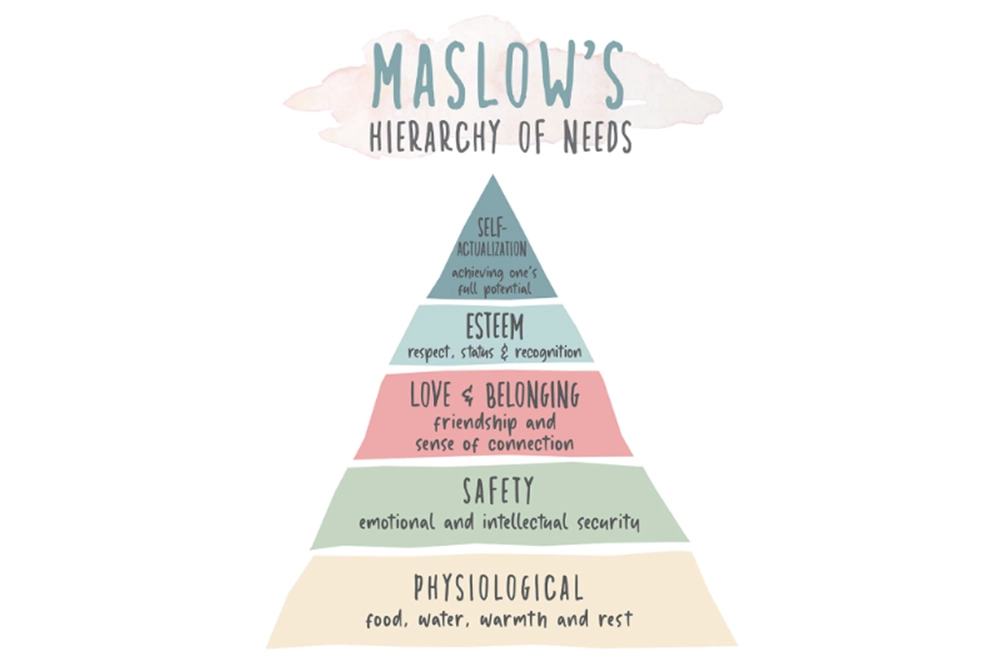Abraham Maslow was an American Psychologist who created the five-level pyramid which explains the basic needs that must be met to reach the highest level of fulfillment and contentment in life. At the bottom of the pyramid is:
Level One: Physiological Needs – food, water, warmth, rest, clothing, and shelter.
Level Two: Safety Needs – Personal security, emotional and physical safe spaces, control, and routine.
Level Three: Belonging and Love Needs – Friendship, intimacy, family, community, healthy relationships.
Level Four: Esteem Needs – Independence, confidence, freedom, status, dignity, (self) respect, recognition.
Level Five: Self-Actualization– Achieving one’s full potential, including creative activities, living in sync with one’s values and beliefs.
Maslow’s Hierarchy of Needs plays an important part in understanding our key role as parents. Think of a child that is acting out and his basic physiological needs have not been met in terms of good sleep or nutrition. How is he going to have the ability to reason and cooperate in the family?
When a child lives in a home that is verbally abusive, are they regularly fearful of the harshness of their parent? If a child does not feel they are accepted, loved, or listened to, it will affect their self-image and ability to form healthy relationships. If a child does not receive affirmation and dignity, it impacts their ability to accomplish developmental milestones in school and other pursuits. If a child is discouraged from pursuing their own values, strengths, and dreams, it will thwart their ability in setting goals and achieving them.
We, as parents, must consider the importance of offering our child our best efforts in meeting each level of their needs. It is easier to let a child stay up late and eat sugary foods, but there is a price to pay for it later. What are some basic physiological needs that might be getting overlooked, but could be an easy place to begin helping your child thrive?
When a child is disciplined, do they feel safe in spite of being in trouble? Is it emotionally safe to communicate problems or ask for help on problem solving with parents?
In addition, instilling security with a predictable routine is important to a child. When they are uncertain which day they are going to dad’s house or who is picking them up from school, it creates anxiety and a lack of security in their world.
Our kids need to know they are loved every day with a hug, a compliment or being included in the family dynamic at dinner. They learn their value in the world from their parents first. The child who feels accepted being themselves at home is also comfortable making new friends and working cooperatively at school. Every person is worthy of respect and the opportunity to develop a healthy self-esteem. Yet when kids get frustrated, many parents criticize and insult who they are as a person, rather than addressing the problem at hand. We need to nurture their confidence by giving them independence to make decisions, make mistakes, and encourage them to try again.
Our role is not to beat the flaws out of our kids, it is to show them the way through encouragement, affirmation and increasing freedoms. When they have matured and are ready to explore their path in life, self-actualization, hopefully they are fulfilled and content because they feel secure, loved, confident and able to pursue their own dreams. No parent is perfect at all of these skills, however it is worth considering the impact a parent can make on their child and their future by attending to each level along the way.
Interestingly, Abraham Maslow grew up poor in Brooklyn as the oldest of seven children from Russian immigrant parents. His basic needs for food and shelter were less than optimal, his neighborhood was dangerous, his mother was cold and unloving, he regularly lifted weights to make his slim build more masculine and his parents did not value his desire to pursue education. You could say that few of his key needs were met on the Hierarchy of Needs to develop, and he understood the impact of it.



